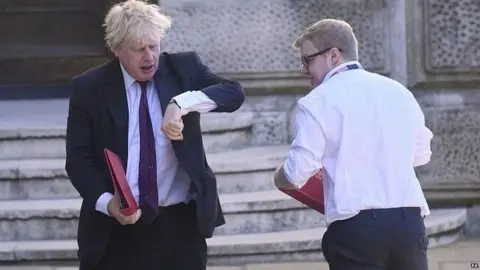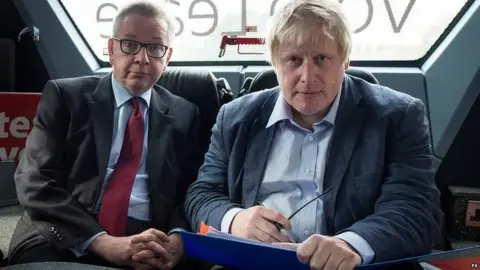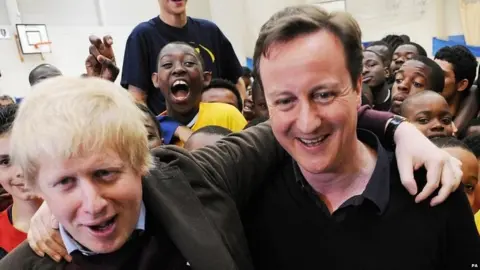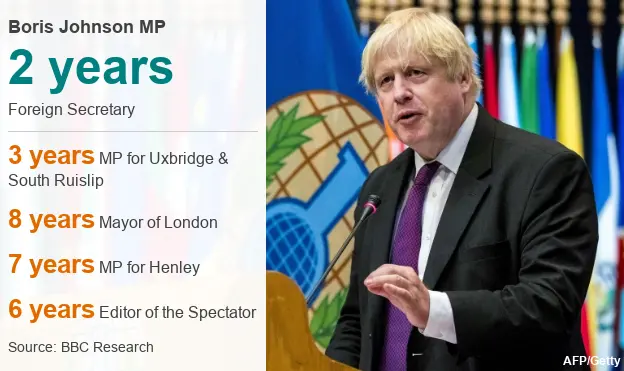Boris Johnson quits: Profile of ex-foreign secretary
 PA
PABoris Johnson's resignation as foreign secretary over Theresa May's Brexit policy will delight some Conservatives and dismay others - but does not come as too great a shock.
The former London mayor and prominent Leave campaigner has been at odds with Mrs May's vision for Brexit for some time and has not been shy of saying so in public, leading many to wonder why he has not been sacked before now.
In May, he called Mrs May's proposals for a post-Brexit customs partnership "crazy".
Last month, he told Conservative donors the prime minister needed to show "more guts" in talks with Brussels and suggested US President Donald Trump could do a better job.
More recently, he warned of a "bog roll" Brexit - which, rather than the clean break from the EU that many Tories want to see, would instead represent a departure that was "soft, yielding and infinitely long".
Then, on Sunday, he was quoted as condemning Mrs May's Brexit proposals - agreed by her cabinet at a day-long meeting at Chequers - in colourful and crude terms.
He claimed defending the plans was like "polishing a turd" - but nevertheless appeared to fall into line with the rest of her ministerial team, as they united behind her, with friends saying he was staying in the cabinet to fight for the kind of Brexit he wanted.
He did not comment publicly, however, in contrast to fellow Brexiteer Michael Gove, who mounted a defence of the PM on the BBC's Andrew Marr programme, saying her plans were the best option for a clean exit from the EU.
Mr Johnson's hand may have been forced by the resignation of Brexit secretary David Davis, who said Mrs May's plans were a "compromise too far".
As the figurehead of the Leave campaign, his political fortunes are seen as being inextricably linked to the government's ability to deliver a Brexit which satisfies the 17.4 million people who voted to leave in the 2016 referendum.
 PA
PAHis frontline political career was widely assumed to be over when Theresa May surprised Westminster by appointing him as foreign secretary on taking office in July 2016.
Known for his gaffes and love of the limelight, many wondered how he would cope with the diplomatic niceties of his new role.
He was not directly involved in the negotiations over the UK's exit from the EU.
Instead, he has spent most of his time banging the drum for Britain abroad and dealing with crises such as Syria and Russia.
However, he has still been a thorn in Mrs May's side.
 PA
PAHe has regularly popped up to issue warnings in Brexit-supporting newspapers about the risk of backsliding on key issues, such as the role of the European Court of Justice, the length of any transition period and the freedom to diverge from EU regulations and standards.
In the run-up to Mrs May's key Florence speech last October, he seemed to set out his own "red lines" for the negotiations, prompting the first of many calls from pro-European Tories for him to be dismissed.
As keeper of the Brexit flame, he has exploited the licence that cabinet divisions and uncertainty over UK policy have given him and others to speak out.
He has been a frequent critic of the Treasury, claiming its fears about short-term economic disruption are blinding officials to the longer-term opportunities.
And he has vigorously stuck by the idea of a Brexit dividend for the UK, repeating the controversial and disputed referendum claim there could be £350m a week in extra cash for the NHS.
The prime minister has resisted calls from the opposition and some on her own side to sack Mr Johnson over his increasingly off-message comments.
Her critics said this shows her weakness, as the leader of a deeply divided government without a Commons majority. It may have reflected a nervousness about what Mr Johnson, who remains popular with many party members, might do on the backbenches.
The 54-year Eton and Oxford-educated former political journalist has harboured ambitions of getting the top job for many years, but was beaten to No 10 by his contemporary David Cameron.

When the MP for Uxbridge and South Ruislip - who was born in New York and until recently held dual US-UK citizenship - finally got his chance to succeed his friend and rival in the summer of 2016, the prize was snatched away from him in the most dramatic fashion.
His campaign manager and fellow Leave supporter Michael Gove abandoned him at the eleventh-hour during the leadership contest, questioning his suitability for the job, and put himself forward instead.
Mr Johnson duly withdrew from the leadership race, a move which angered some of his supporters who questioned whether he had the stomach for the fight.
His critics say his ambition trumps his principles, most recently when he flew to Afghanistan rather than take part in a vote on the expansion of Heathrow airport, which he has vehemently opposed for many years.
The question now is whether his resignation is a prelude to another leadership bid.
